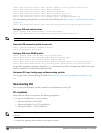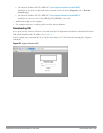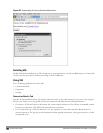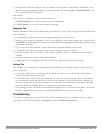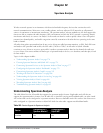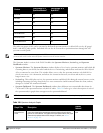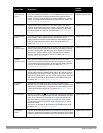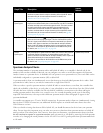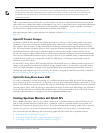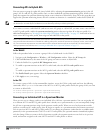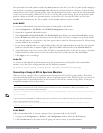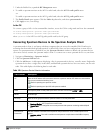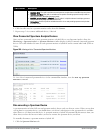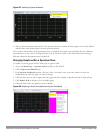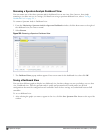
NOTE: A spectrum monitor or hybrid AP automatically disconnects from a client when you close the browser window you used to
connect the spectrum monitor to your client. However, if you are using Internet Explorer and have multiple instances of an
Internet Explorer browser open, the data-streaming connection to the spectrum monitor or hybrid AP is not released until 60
seconds after you close the spectrum client browser window. During this 60-second period, the spectrum monitor is still
connected to the client.
When a spectrum monitor or hybrid AP is not subscribed to any client, it still performs all classification tasks and
collect all necessary channel lists and device information. You can view classification, device and channel information
for any active spectrum monitor or hybrid AP via the controller's command-line interface, regardless of whether or
not that device is sending real-time spectrum data to another client WebUI.
Individual spectrum analysis graphs and charts are explained in detail in "Customizing Spectrum Analysis Graphs" on
page 582.
Hybrid AP Channel Changes
By default, a hybrid AP only monitors the channel specified in its 802.11a or 802.11g radio profile for spectrum
interference. If you want to change the channel monitored by a hybrid AP, you must edit the channel setting in
those profiles. There are, however, other ArubaOS features that may automatically change the channels on hybrid
APs. APs using Dynamic Frequency Selection (DFS) perform off-channel scanning to detect the presence of satellite
and radar transmissions, and switch to a different channel if it detects that satellite or radar transmissions are
present. APs using the Adaptive Radio Response (ARM) feature constantly monitor the network and automatically
select the best channel and transmission power settings for that AP. If you manually change a channel monitored by
a hybrid AP, best practices are to temporarily disable the ARM feature, as ARM may automatically return the
channel to its previous setting.
If a hybrid AP is using ARM or DFS, that hybrid AP may automatically move to a different channel in response to
changes in the network environment. If a hybrid AP changes channels while it is connected to a spectrum analysis
client, the hybrid AP updates the graphs in the spectrum dashboard to start displaying spectrum data for the new
channel, and sends a log message to the session log. For details on changing the channel monitored by a hybrid AP,
see "802.11a and 802.11g RF Management Profiles" on page 424.
Hybrid APs Using Mode-Aware ARM
If a radio is configured as a hybrid AP and that AP is enabled with mode-aware ARM, the hybrid AP can change to
an Air Monitor (or
AM
) if too many APs are detected in the area. If the ARM feature changes a hybrid AP to an Air
Monitor, that AM does not provide spectrum data after the mode change. The AM unsubscribes from any connected
spectrum analysis client, send a log message warning about the change. If mode-aware ARM changes the AM back to
an AP, the hybrid AP does not automatically resubscribe back to the spectrum analysis client. The hybrid AP must
manually resubscribed before it can appear in the client’s spectrum monitors page.
Creating Spectrum Monitors and Hybrid APs
Each controller can support up to 22 active WebUI connections to spectrum monitor or hybrid AP radios. If you
plan on using spectrum monitors or hybrid APs as a permanent overlay to constantly monitor your network, you
should create a separate AP group for these devices. If you plan on temporarily converting campus APs to spectrum
monitors, best practices are to use the spectrum local override profile to convert an AP to a spectrum monitor.
This section describes the following tasks for converting regular APs into hybrid APs or spectrum monitors.
l "Converting APs to Hybrid APs " on page 575
l "Converting an Individual AP to a Spectrum Monitor" on page 575
l "Converting a Group of APs to Spectrum Monitors" on page 576
DellPowerConnectW-SeriesArubaOS6.2 | User Guide Spectrum Analysis | 574



